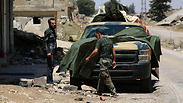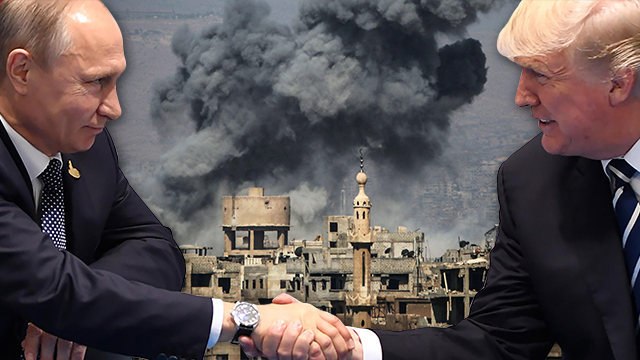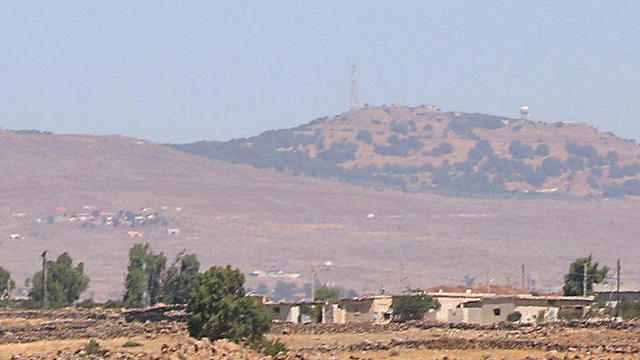
Israel a key player in Syria ceasefire deal
Analysis: The agreement signed between the US, Russia and Jordan would likely have never been born without Israel’s involvement, in light of its alleged influence on rebel elements in the Syrian Golan Heights. If it lasts, the truce could remove the threat of an Iranian-Hezbollah front in the Golan, but that is unlikely due to the difficulty tin restraining the groups operating on the ground.
Granted, the chance that the agreement reached during US President Donald Trump’s meeting with Russian President Vladimir Putin will last isn’t high. But Israel is a key player. Herein lies the strength hidden in the political leverages of pressure Israel has gained, in light of its alleged relations with rebel elements in the Syrian Golan Heights.
Israel’s aerial activity in the Quneitra area in recent weeks, in response to spillovers of fire from the battles in the area, likely also contributed to Israel’s status as an element that cannot be ignored in any agreement in the Golan area.
If it lasts, the ceasefire agreement would remove the threat of another front—Iran-Hezbollah—being established in the Golan Heights. It seems like an important Israeli diplomatic achievement.

The agreement, which has been taking shape for several weeks now, was revealed a week ago and signed in the summit between the two presidents. It includes a ceasefire in three Syrian regions—Suwayda, Daraa and Quneitra—which surround the Israeli Golan Heights: Starting from Jabal al-Druze, through the Yarmouk Basin, all the way north to Quneitra. The most important Israeli interest can be found in these areas: Pushing the Iranian presence far away from the joint border.
The ceasefire agreement was born after the Russian attempt to create buffer zones along the Syrian border with the neighboring countries failed. Both the Americans and the Russians discovered that their allies on all side were making an effort to disrupt any possibility for an agreement in Syria. The long talks conducted by the Russians in Astana on the buffer zone issue were sabotaged by the Turks. Previously, the Iranians or the rebels’ representatives were the ones who thwarted the talks.
The Russians and the Americans eventually decided to ignore their partners to the reconciliation talks and reach a one-sided agreement on a ceasefire in the area where Russia and the US have a clear shared interest in a calming of violence. America’s allies in the region, Israel and Jordan, feel threatened by these areas and are threatening to use force. The Russians, at this stage, have no interest in a deterioration in the situation there and in harming the Assad regime’s interests. The agreement implies that, for now, all parties involved agree that Assad will remain in power.
As part of the agreement, the Americans pledged to maintain the ceasefire by influencing their allies, the Israelis and the Jordanians. In the southern Golan Heights to Jabal al-Druze, the American and Jordanians would work together to make their rebel allies on the Syrian side of the border hold fire. In the Quneitra area there is no one the Americans can influence, apart from Israel, which allegedly has some influence on rebel organizations and therefore had to be part of the equation.

The Russians pledged to influence the Syrian army and its allies to hold fire through a supervision mechanism comprised of “Russian military police” brigades. These are fighting units which, upon landing in Syria, were declared military police units that would maintain order. These brigades would be deployed in the three regions where the ceasefire is supposed to take place, including the Quneitra area.
There is a small chance that this ceasefire will be maintained, as any agreement between the US and Russia in Syria depends on the relationship between the two world powers in other areas. For example, there is an issue on the agenda today of confiscating American diplomatic equipment in Moscow in response to the confiscation of Russian diplomatic equipment at the end of former US President Barack Obama’s term, when he kicked 35 Russian diplomats out of Washington on suspicion of espionage. The Russians have announced that if the sides fail to reach a on the issue by late July or early August, they will confiscate the American ambassador’s residence in Moscow, and that could disrupt the situation in Syria.
Immediately after the Putin-Trump meeting, the US Congress announced its plan to step up sanctions against Russia over violations of US non-proliferation law. Such a move could also torpedo any agreement in Syria. It’s more likely, however, that the ceasefire agreement will be undermined on the ground itself, as the groups operating on the ground—members of the al-Nusra Front, Iranian volunteers, ISIS fighters, elements in the Syrian army, etc.—can’t really be restrained and convinced, so the agreement could spin out of control at any given moment.










